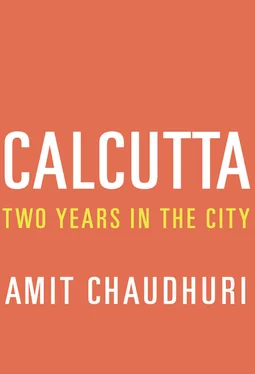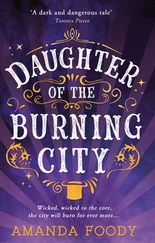“There’s nothing of interest in your area,” a friend, the political scientist Dwaipayan Bhattacharya, assured me. So, directed by him, I went to the faraway southern reaches of the city, which are still semi-rural, and to which development and real estate are threatening to come rapidly. A fairly recent highway, the Eastern Metropolitan Bypass, took me to Kamalgachi, where a man was selling watermelons from a cart on the side of the road, right next to a camp of casually congregated, but disciplined-looking, Trinamool Congress workers. “How’s voting been going?” I asked, and he grinned and confirmed it was going well. “So I presume you’re doing good business?” I said, glancing at the watermelons, to which he grinned again, enigmatic but not unmindful of the larger context I was drawing his attention to. I wanted to know if this was a regular spot for him; he shook his head, saying he had no fixed location. This strategic point on the curve of the bypass, not far from the narrow inlet of a lane that led to the polling booth, was, for the present, a useful place to be. He was dark, moustached, rakish-looking: I can’t imagine he was more than thirty-five years old. Two older men, customers, had sniffed something anomalous about my presence and become curious. They too wanted to be questioned, and, in an unspoken pact, I obliged them. “What do you do?” I asked. “Hawkery,” said one a bit apologetically, making a Bengali noun of his profession. “I used to work for Usha Fans, but there are no jobs in the fan business any more.” His friend was a mechanic for two-wheelers. “Well, do you think paribartan will come?” I asked, deliberately throwing up the oft-repeated word. They laughed at the joke: “Come it will!” said the hawker and former Usha Fans employee. “Are you voting Trinamool?” “We’ve finished voting,” he said, with the air of a man who’s had his “high” early in the day, and isn’t entirely sure whether that’s a good or bad thing. “I used to vote CPI(M) once, but it’s Trinamool this time.” “Do you think they’ll do any good?” “I don’t know, but it’ll put an end to the ‘aamar lok’ mindset.” Aamar lok means “our lot”: the hawker was referring to the rampant partisanship of which the Left in Bengal is accused.
“Is it true, what someone just told me about aamar lok?” I asked one of the CPI(M) men sitting at a table on the opposite side of the by-lane that went in at a right angle from the bypass, and which tactfully separated the small Trinamool and Left Front contingents. He was a quiet, dark, portly man called Suleiman Sardar. He shook his head at the canard. “Look at me. I’ve spent all my life as a driver, and I still don’t have a government job.” “Really?” “Yes, and I’ve been working for the Party since 1980, when I was eighteen”—that made him my exact contemporary—“and I got Party membership in 2000. My friend, who was a Party worker, was an auto-rickshaw driver, and died recently.” So the Party was their life, but it didn’t follow it was their profession. “What do you think the outcome will be?”—I gestured towards the invisible polling station. “It’ll be tight,” he replied, echoing Nirupam Sen, making me wonder if this was a last-minute Party line; but his settled equanimity suggested he’d come to this conclusion himself. “Frankly,” he said, respectful but firm, “there’s no wind of paribartan blowing here.” It was as if this was a simple, physical fact of the weather — there was either a wind ( hawa ) or there wasn’t. The young men of the Trinamool, to whom I’d spoken earlier, had a directly opposed view, however, and had volunteered: “There’s a wind of paribartan blowing here.” I tended to agree, but I was no longer sure if I could actually feel a wind or not. It was undoubtedly hot. I’d said to the Trinamool men, “Will you reject the aamar lok ethos, or continue the politics of patronage? And will Bengal emerge from the rut of reactive politics it’s been stuck in for two decades, where one party says to the other, ‘Whatever you do, I’ll do the opposite’? If it doesn’t, this state is doomed, notwithstanding the paribartan that may take place now.” Everyone I said this to on the 27th — because I repeated the questions at several places — nodded and shook their heads at the correct moments, with a sweet reasonableness peculiar to that day.
I went further south, past Narendrapur into Rajpur. The name invokes bygone grandeur, but, apparently even in the seventies, it was mainly rural, with fields predominant rather than houses. Boral, the village in which Satyajit Ray shot Pather Panchali , isn’t that far from here. It was now defined by a main road with a small-town procession of shops and low houses on either side, with a maze of lanes emanating from it: a place to be passed through, its life wondered at through a car window. In a characteristic narrow alley off this road, wide enough for a single car, sat the Left and Trinamool “camps,” ignoring each other, at least two hundred metres away, according to the Election Commission’s ruling, from the polling station. The Left greeted me jovially, among them my namesake, Amit Sarkar (known, he said, to friends as “Babu”), and his ebullient wife, Rupali. She was particularly upbeat, showering my cupped palm with Chloromint chewing gum, which, according to laboriously funny TV commercials, has unique cooling qualities. She probably had abundant access to the gum since Mr. Sarkar owns a medicine shop. No signs of down-heartedness were discernible — as if this group was either naturally playful and voluble or buoyed up by an oxygen they’d been breathing in for thirty-four years. The Trinamool man, hunched over a desk, was quieter; he was welcoming, but there was a shadow over him. He had the air of one who’s been biding his time; in a sense, he was, even now, crouched in the wings, separate from the main drama. Serious and geeky, he turned out to be, sure enough, a computer graphic designer. He was doing this work from a sense of apamaan (of having been insulted) and jaala , he said — that is, a burning that may arise from resentment, envy, or a sense of injustice. “You can’t even get a tap installed in a new house unless you’re a CPI(M) man,” he declared bitterly. He had two energetic, waif-like working-class men standing on either side (they’d occupied the small porch of a house), who were muttering their own stories and contributions, as if they might be otherwise heard by Mr. and Mrs. Sarkar in the distance, with whom relations were, naturally, polite but frigid. One, Shyamal Ray, was a fishmonger (but the word he used was “hawker”) at Gariahat, and the other, Mahadev Dey, also plied his trade at Gariahat (a twenty-minute walk from where I live), selling bags in front of City Mart. His old stall had been wrecked and his possessions looted by CPI(M) workers during Operation Sunshine in 1997, at one o’clock in the morning, he told me in his low, urgent undercurrent of words — Operation Sunshine being the government’s attempt to rid Gariahat of hawkers and of the dreadful (now non-existent) stretch called, wishfully, the “boulevard.” Some say it was a bankrupt government’s response to the IMF’s demand that it clean up the city before it received yet another loan — a demand at which Jyoti Basu had reportedly sniffed dismissively, “Mamar badi!” or “Do you think Calcutta’s your personal backyard?” which is what a mamar badi or maternal uncle’s house is traditionally said to be for delinquent nephews. Mahadev Dey was a Left sympathiser but had grown disenchanted, until his vision of himself and his future had revived with his discovery of “didi.”
People were voting at the primary school on the same lane, the Rajpur Harkali Vidyapith (established 1967). Despite being peopled and busy, it looked like a municipal husk of what it was, as if it had been built almost inadvertently, and with a minimum of fuss, to dispense the Bengali and English alphabets to the children of the less privileged. A BSF officer, a handsome, gracious South Indian, permitted me to interview the voters standing in the two queues: one for men, the other for women. The young men looked like they had no regular employment; they broke into a strange laughter on being questioned. They’d decided I was hilarious, sidling up to them, and had a hard time remaining serious or even civil — and I, once again after my schooldays (how appropriate, then, that this should be happening in a school compound), felt conspicuous and silly in the eyes of the hardened boys. When I asked them if their vote today was of particular importance, they appeared offended and vigorously denied it. The women were friendlier and more personable, and I had an easier time with them: I spoke to two board-thin working-class women who described their occupation with the English word “housewife,” though they could well have been domestic help. I tried to make conversation with a beautiful, stand-offish girl in a smart salwaar kameez, a student of art history at a little-known art college; further up the queue, a girl who, as it turned out, worked at a travel agency, kept turning back to look. “Do you sometimes think you might need to leave Bengal for better opportunities?” I asked. “No, I don’t agree with that,” said the art history student, inching forward with the queue. But the girl at the travel agency, who was very close to the door to the classroom, swerved back again to look at me and said, “There’s no future here in my profession.” I moved towards her, like a salesman who has limited time to make a pitch. “You think you’d have better prospects in Delhi and Bombay?” The art student, to whom I’d simultaneously flung this question through an instant of eye-contact, shook her head, sphinx-like and self-contained; but the girl at the travel agency conceded this with a helpless wisdom: “ I think so. And that’s what others in my profession say so too.” “What do you think of Calcutta’s present position? Do you know, for instance, that it was once, and for a long time, India’s foremost city?” She confessed this was news to her. “Perhaps. But the Calcutta I grew up in is all I know.”
Читать дальше












